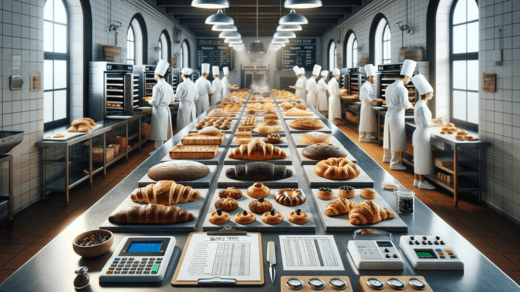Baking quality is essential for producing delicious and visually appealing baked goods that meet consumer expectations. Whether it’s a loaf of bread, a batch of cookies, or a decadent cake, achieving consistent quality requires attention to detail, proper techniques, and high-quality ingredients. In this article, we’ll explore the importance of baking quality, key strategies for ensuring consistent results, and considerations for maintaining excellence in the baking process.
1. Ingredient Selection and Quality
The foundation of baking quality begins with ingredient selection and quality. Using fresh, high-quality ingredients is essential for achieving superior taste, texture, and appearance in baked goods. Flour, sugar, eggs, butter, and leavening agents should be sourced from reputable suppliers known for their consistency and purity. Additionally, specialty ingredients such as chocolate, spices, and flavorings should be of the highest quality to enhance the overall flavor profile of baked goods.
2. Proper Measurement and Scaling
Accurate measurement and scaling of ingredients are critical aspects of baking quality. Even minor variations in ingredient quantities can significantly affect the outcome of baked goods, leading to inconsistencies in texture, flavor, and appearance. Bakers should use precise measuring tools, such as kitchen scales and measuring cups, to ensure that ingredients are accurately weighed or measured according to the recipe. Additionally, proper scaling techniques should be employed to maintain consistency when producing large batches of baked goods.
3. Temperature Control and Oven Calibration
Temperature control is another crucial factor in achieving baking quality. Oven temperature should be carefully monitored and calibrated to ensure that it remains consistent throughout the baking process. Fluctuations in oven temperature can lead to uneven baking, over or undercooked products, and undesirable texture or color changes. Bakers should invest in reliable oven thermometers and regularly calibrate their ovens to ensure accurate temperature control.
4. Mixing and Development Techniques
The mixing and development process plays a significant role in determining the texture and structure of baked goods. Proper mixing techniques should be employed to ensure thorough incorporation of ingredients without overmixing, which can lead to tough or dense baked goods. Depending on the type of baked good being produced, different mixing methods, such as creaming, folding, or kneading, may be employed to achieve the desired results. Additionally, proper dough or batter development is essential for ensuring optimal rise, crumb structure, and overall quality in baked goods.
5. Monitoring and Testing
Continuous monitoring and testing are essential for maintaining baking quality throughout the production process. Bakers should regularly inspect dough or batter consistency, color, and aroma to ensure that it meets the desired specifications. Additionally, in-process testing, such as internal temperature checks for bread or cake doneness, can help identify any issues early in the baking process and make necessary adjustments to maintain quality. Quality control checks should be conducted at multiple stages of production to ensure consistency and adherence to standards.
6. Training and Education
Finally, investing in training and education for baking staff is crucial for achieving and maintaining baking quality. Properly trained bakers understand the principles of baking science, techniques, and best practices, allowing them to consistently produce high-quality baked goods. Training programs should cover topics such as ingredient functionality, mixing methods, oven operation, and troubleshooting common issues. By empowering baking staff with the knowledge and skills they need, bakeries can ensure that quality remains a top priority in every aspect of the baking process.
Conclusion
In conclusion, baking quality is essential for producing delicious, consistent, and visually appealing baked goods that delight consumers. By focusing on ingredient selection, proper measurement, temperature control, mixing techniques, monitoring, and staff training, bakeries can ensure that every product meets the highest standards of quality. By maintaining a commitment to excellence in every aspect of the baking process, bakeries can build customer trust, loyalty, and reputation for delivering exceptional baked goods.
For more on baking quality tests, check this out.






